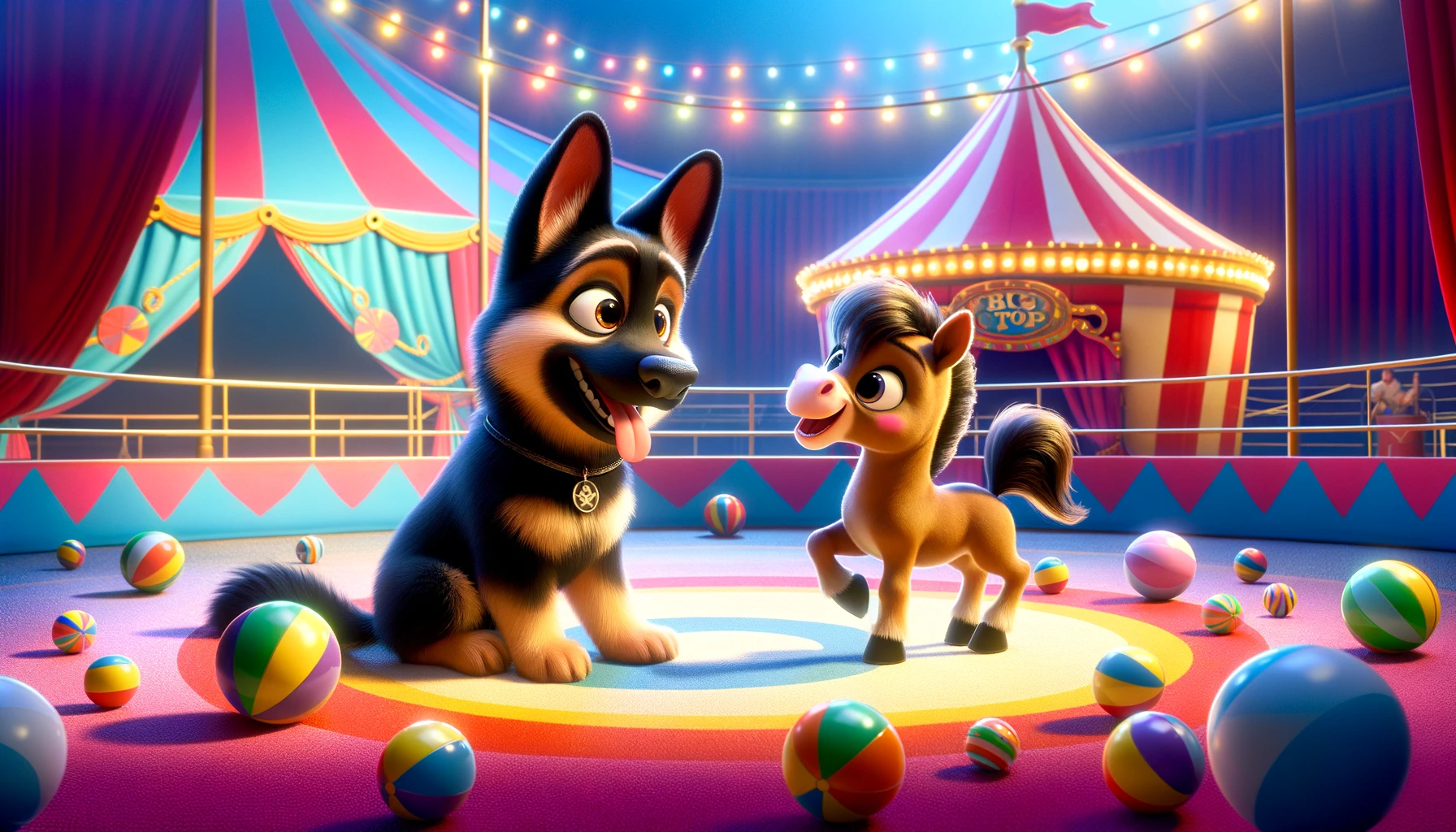We’ve all been there – you show up to some flashy conference or event expecting to be blown away, only to realize it’s all just smoke and mirrors.
The fancy demos fizzle out, the wild promises ring hollow, and you find yourself wondering, “Where’s the substance?” Congratulations, you’ve been the victim of a good ol’ dog and pony show.
This folksy idiom has been around for ages, used to describe anything that’s all style and no steak. This article will cover everything you need to know about the meaning, history, usage, and humor behind the phrase “dog and pony show.”
We’ll gallop through plenty of funny examples and even trot out some other animal idioms. So, let’s giddy up and dive right in!
Table of Contents
Key Takeaways
| Key Takeaway | Description |
|---|---|
| Meaning | A flashy event lacking substance, symbolizing style over substance spectacles. |
| Origin | Originated from late 19th-century small traveling circuses, now used to describe overhyped events. |
| Usage | Versatile idiom for critiquing superficial presentations in politics, business, or marketing. |
What Does “Dog and Pony Show” Mean?
A dog and pony show is defined as an elaborate, flashy affair or performance designed to showcase and impress. But when examined more closely, it lacks any real value, purpose, or substance behind the extravagant front.
Essentially, someone is putting on a big, splashy production with the goal of charming, bedazzling, or persuading you – be it a business, politician, or salesperson. But their glittering showpiece is merely a facade concealing the fact that there is very little of worth being offered.
The phrase evokes imagery of a small, subpar circus. One where a cute dog performs some easy tricks and a pony slowly plods around a circle. While mildly entertaining, it’s hardly a spectacular show.
The dog and pony act promises more than it can deliver. Hence, when someone derides something as a “dog and pony show,” they’re accusing it of being heavy on style and light on content – all sizzle and no steak.
Origin and History of a Dog and Pony Show
The idiom “dog and pony show” stems from the late 19th century when small traveling circuses roamed America. These tiny ragtag affairs put on very rudimentary shows, often featuring a few dogs doing tricks coupled with some ponies parading monotonously around a ring.
While charming in their own homespun way, these simple dog and pony acts paled in comparison to the incredible sights and death-defying feats you’d witness at larger, more renowned circuses. The shows were incredibly short too, leaving attendees feeling underwhelmed.
By the early 20th century, Americans had adopted “dog and pony show” as a sarcastic idiom to describe any lackluster spectacle that overpromised and underdelivered. It might have dazzling trappings on the surface, but ultimately fails to impress.
Politicians kicking off campaigns often put on elaborate dog and pony shows in hopes of drumming up voter support and enthusiasm. But citizens soon came to see these over-the-top events as carefully orchestrated fluff.
Likewise, when businesses hype up a new product with great fanfare, but consumers find it doesn’t work nearly as well as advertised, they’ll complain, “That was just a dog and pony show!” The idiom conveys a sense of being duped and let down.
Beguiled by this canine phrase? Unleash your curiosity with our detailed exploration of dog idioms.
Using “Dog and Pony Show” in a Sentence
One reason this colorful phrase has stood the test of time is because it’s incredibly versatile. “Dog and pony show” can be applied to so many situations:
- “The keynote speech was nothing but a dog and pony show – all style and no substance.”
- “The CEO put on a dog and pony show to make the company’s prospects seem better than they really are.”
- “Don’t let the software company’s flashy product demos fool you. They’re just dog and pony shows designed to generate buzz.”
- “The new boss came in promising major changes, but so far it’s turning out to be a dog and pony show.”
- “If you ask me, this whole conference is a dog and pony show to make us feel special when nothing will really change.”
- “We sat through that salesman’s dog and pony show, but there’s no way we’re buying that overpriced product.”
- “The senator’s campaign rally was clearly a dog and pony show – lots of cheerleading but no concrete policies.”
As you can see, “dog and pony show” is commonly used to call out hollow political, business, or marketing hype. But it can also describe any pretentious event that turns out to be anticlimactic.
Synonyms and Variations
Part of what makes idioms so fun is the creative ways you can remix them. Here are some synonymous ways to say “dog and pony show” to spice up your vocabulary:
| Synonyms/Variations | Description |
| Song and dance | Another way to describe a misleading or distracting performance or argument. |
| Smoke and mirrors | Used to describe something that deceives or distorts the truth. |
| Bells and whistles | Features that are attractive or attention-getting but potentially superficial or unnecessary. |
| Razzle dazzle | A flashy, showy, and elaborate action or display intended to impress. |
| Fluff and folderol | Meaningless or frivolous details added for show. |
| Flash in the pan | Something that promises great success but fails to deliver. |
| Fool’s gold | Something that appears valuable or worthy but is actually worthless. |
| All hat, no cattle | All talk and appearance with no substance or action behind it. |
| All sizzle, no steak | Something that does not live up to its hype or appearance. |
You can also swap out “dog” for different animals for fun variations:
| Variation | Fun Description |
| Cat and pony show | A playful twist on the original, suggesting a more cunning or sneaky display. |
| Horse and pony show | Emphasizes strength or showmanship in the display. |
| Duck and pony show | Suggests something more whimsical or possibly chaotic. |
| Goat and pony show | Could imply stubbornness or unpredictability in the performance. |
| Chicken and pony show | Might suggest a display that’s more frantic or less serious. |
Other Common “Dog” Idioms and Expressions
Dogs populate many idioms due to being so near and dear to our hearts since ancient times. Here’s a primer on some other popular doggy sayings:
| Idiom | Meaning | Example Sentence |
| In the doghouse | In trouble or out of favor. | “After forgetting our anniversary, I’m going to be in the doghouse with my wife.” |
| Work like a dog | Work extremely hard. | “I’ve been working like a dog prepping for this meeting.” |
| Dog days | The hot, sultry days of summer. | “The dog days of August are brutal without air conditioning.” |
| Lucky dog | A very fortunate person. | “You lucky dog for getting front row tickets to Hamilton!” |
| Go to the dogs | Go to ruin; become depraved. | “Ever since the pandemic, this neighborhood has gone to the dogs.” |
| Dog tired | Utterly exhausted. | “After finals week, students are dog tired.” |
| Dog eat dog | Fierce, ruthless competition. | “It’s dog eat dog trying to get a summer internship on Wall Street.” |
| Tail wagging the dog | Situation backwards, with the subordinate part in control. | “With how the assistant runs the office, it seems the tail is wagging the dog.” |
| Let sleeping dogs lie | Leave a troubling situation alone lest it worsens. | “I wouldn’t bring up your ex – it’s best to let sleeping dogs lie.” |
Interesting Facts and Stories
Beyond its literal origins, some fascinating bits of trivia prove our furry friends are woven into the fabric of this idiom:
- In the 1920s, “dog and pony show” gained wider use from vaudeville variety shows that traveled around featuring – you guessed it – performing dogs and ponies.
- By the 1930s, the idiom became attached specifically to elaborate presentations made by advertisers and publicists.
- In 1939, John Steinbeck used “dog and pony show” in his iconic novel The Grapes of Wrath to describe flashy circuses designed to swindle farm families out of money.
- A 1945 Washington Post article on Congress complained of representatives putting on a “political dog and pony show” instead of focusing on legislation.
- In the 1970s, corporations and politicians began using “dog and pony shows” for flashy PR events to promote products or people.
- Apple founder Steve Jobs was known to dismiss superficial product demonstrations as “dog and pony shows” and valued substance over style.
So next time you claim something is all dog and pony, know you’re invoking a uniquely American idiom with quite a pedigree!
Conclusion
And there you have it – everything you could possibly need to know about the origins, meanings, and misadventures of the funny phrase “dog and pony show.” With this article under your belt, you’ll be able to spot flashy frauds from a mile away. No more falling for empty spectacle and hype.
Just remember that if you do happen to get roped into a particularly impressive dog and pony show, try to enjoy the theatricality of it all. And make sure to feed those performing pooches some treats for their efforts. They’re good dogs just trying their best. Even ponies need their time in the spotlight. But don’t let the flashy show stop you from demanding the substance you deserve.

